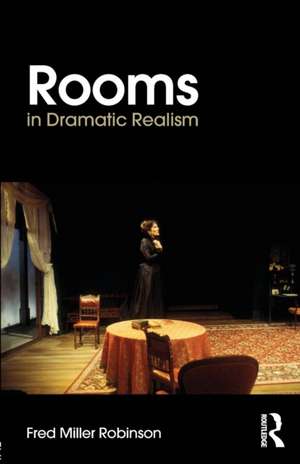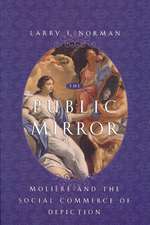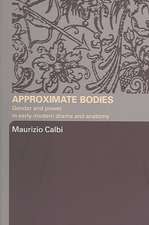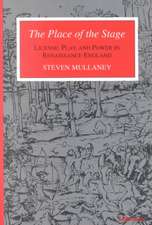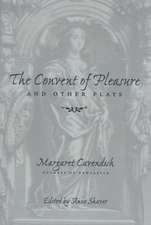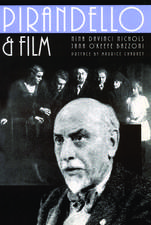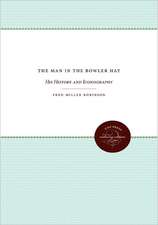Rooms in Dramatic Realism
Autor Fred Miller Robinsonen Limba Engleză Paperback – 24 noi 2015
Fred Miller Robinson’s enjoyable and stimulating essays on this enduring genre tackle the dreams and anxieties of the middles classes of the Industrial Revolution – dreams of domestic comfort and refuge, and anxieties about how entrapping that comfort could be.
Moving from Ibsen to Chekhov and onwards into later plays in which the reality of ‘Realism’ comes under scrutiny, this is a book to dip into before a performance or to study during a class.
| Toate formatele și edițiile | Preț | Express |
|---|---|---|
| Paperback (1) | 343.72 lei 6-8 săpt. | |
| Taylor & Francis – 24 noi 2015 | 343.72 lei 6-8 săpt. | |
| Hardback (1) | 994.29 lei 6-8 săpt. | |
| Taylor & Francis – 7 dec 2015 | 994.29 lei 6-8 săpt. |
Preț: 343.72 lei
Nou
Puncte Express: 516
Preț estimativ în valută:
65.78€ • 68.42$ • 54.30£
65.78€ • 68.42$ • 54.30£
Carte tipărită la comandă
Livrare economică 12-26 aprilie
Preluare comenzi: 021 569.72.76
Specificații
ISBN-13: 9781138953642
ISBN-10: 1138953644
Pagini: 126
Dimensiuni: 138 x 216 x 17 mm
Greutate: 0.16 kg
Ediția:1
Editura: Taylor & Francis
Colecția Routledge
Locul publicării:Oxford, United Kingdom
ISBN-10: 1138953644
Pagini: 126
Dimensiuni: 138 x 216 x 17 mm
Greutate: 0.16 kg
Ediția:1
Editura: Taylor & Francis
Colecția Routledge
Locul publicării:Oxford, United Kingdom
Public țintă
General, Postgraduate, and UndergraduateCuprins
Preface Part 1: Rooms: An Introduction 1. Box Sets 2. Caste and Caste 3. The Addiction to Dwelling 4. The Lapsed and the Lost: The Pillars of Society 5. Inside and Outside A Doll’s House 6. Notes on Nora’s Experience of the Room 7. Close Quarters: The Phenomenal Room 8. Lavender, Dried Roses and Death: Hedda Gabler 9. The Back Room: The Wild Duck 10.Making Room: The Master Builder 11. A Note on Ibsen’s Radicalism 12. The Shelf Life of Dramatic Realism 13. Realism and Scenic Space 14. The Structure of Meaning in Dramatic Realism Part 2: Specimens 15. Suburban House: Candida 16. Living Room: A Raisin in the Sun 17. What’s Right: Two Trains Running 18. Standing for Something: A Long Day’s Journey into Night 19. Long Night’s Journey into Day: A Delicate Balance 20. The Dump: Who’s Afraid of Virginia Woolf? 21. Domus Lugubris: Translations 22. Darker In than Out: The Room 23. Keeping House: The Birthday Party 24. Dungheap: Curse of the Starving Class 25. No Refuge: The Lower Depths 26. Speed Therapy: The Iceman Cometh 27. Upstairs: The Dumb Waiter 28. The Something Else: Miss Julie 29. Economic Betterment: Oleanna 30. The Good Life: ‘night, Mother 31. Natural Habitat: The Slave Part 3: Variations 32. Ghost Rooms: The Cherry Orchard 33. Sleepers Awake: Heartbreak House 34. The Big House: Summer 35. Eviction: The Three Sisters 36. Settling: Fifth of July 37. Their Master’s Voice: Aristocrats 38. Outside Inside: Dancing at Lughnasa 39. The Usual Darkness: All My Sons 40. The Office: Uncle Vanya 41. Gardens: Mrs. Warren’s Profession 42. Control Booth: Ma Rainey’s Black Bottom Part 4: Interventions 43. Mom’s House: True West 44. Ghosts: The Piano Lesson 45. Recumbency: Plenty 46. Out of Bounds: A Streetcar Named Desire 47. It All Happens: Old Times 48. Out Back: Buried Child 49. The Inside of his Head: Philadelphia, Here I Come! 50. Diamonds in the Dark: Death of a Salesman 51. Sitting in the Dark: Fefu and her Friends 52. Visitors: "Heart’s Desire" 53. Exit through the Window: The Swan Addendum: Amour Works Cited
Descriere
Dramatic Realism, since its birth in the hectic late years of the nineteenth century, gave theatrical and thematic energy to the interaction between a play’s text and the way that it looked on the stage. Characters began to find themselves in rooms and settings that played an active and changing role in the drama, and their dialogue and reactions evolved in time with these changes. Fred Miller Robinson’s enjoyable and stimulating essays on this enduring genre tackle the dreams and anxieties of the middles classes of the Industrial Revolution. Moving from Ibsen to Chekhov and onwards into later plays in which the reality of ‘Realism’ comes under scrutiny, this is a book to dip into before a performance or to study during a class.
